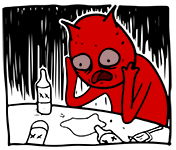Harthwain
The problem is twofold.
First, as far as alignment systems go, traditional DnD one is about the shittiest one can imagine, apart from maybe 4e one.
Second, there is no actual reason to ever have *an* alignment system, and that's just as true for cRPG as for tabletop.
Just because an act is labeled evil does not make it wrong.
I'd say "evil" as a descriptor gives a wrong idea about one's motivation, but it'd also be hard to come with a different word for describing the overall disposition. To clarify: "Evil" doesn't mean "a spawn of hell". More like "a person who acts in his own self-interest in mind, and who doesn't care about hurting others while doing so".
There is a better descriptor for that.
Selfish.
Selfish VS selfless makes a much better and unambiguously defined axis than good VS evil.
For starters, it doesn't create needless confusion between unscrupulously selfish fuck kind of evil and demented suicidal cult kind of evil.
It doesn't create headscratchers regarding WTF is TN supposed to represent, nor how the fuck do non-social animals fit into the diagram if a person with the same sort of outlook would generally be labelled as NE or CE.
And it doesn't tangle value judgement and moral judgement into a single unhappy mess.
Next, you could probably collapse the entire chaotic end of the whole diagram into a point ending up with a triangle stretched between lawful altruistic, lawful egotistic and chaotic. Chaotic admits no external rules, including moral ones, to live by - a chaotic creature is its own sovereign nation and because of that selflessness makes no sense to a being of pure chaos, even though it doesn't really need to be malevolent. It just doesn't care about any kind of social factors.
Lawful altruistic wants to leverage society to create utopia and maximize happiness of everyone.
Lawful egotistic wants to build well organized hierarchy benefiting THEM.
In between you have all sorts of variants, for example going from lawful altruistic towards chaos you admit increasing amounts of freedom, going towards lawful egotistic you admit increasing amounts of suffering into your system.
And so on.
You see, you can make alignment systems by dozens and most will be better than DnD one, even ones derived from it.
It's not rocket surgery.
But the real elephant in the room is - why the fuck would you want to?
Just because it's working as designed doesn't mean it's a good design (for a video game).
Reputation system in BG is too simplistic to work well together with alignment, because it assumes that high reputation equals you being good, while low reputation means you are evil. As you said, it fails at nuances. Like; Edwin should be OK basking in the glory because he's prideful and it could help his own reputation (as a member of the praised company) or Korgan be fine with whatever you're doing as long as the money is flowing his way.
Precisely.
Systems failing mechanically is generally the problem of video games, but simply copying how tabletop DnD works is not going to cut it, considering the different level of interaction in cRPGs. That's why instead of talking about tabletop alignment system (which for some reason everybody is doing in this thread) the much better discussion would be: "How could you translate the alignment system to make it work - mechanically - in a computer game?".
Alignment system buys you nothing in a vidya game. You probably want some programmatic way of simulating NPCs outlook for AI reasons, but that's something you never expose to the players directly. It's not part of your RPG system any more than the shaders you wrote are, and you don't want to hamfistedly imprint this kind of kludge on your entire worldbuilding.
And you don't need that in a tabletop either, because humans are naturally good at reasoning about people's motives and so on - to the point where your regular stone-age bare-assed tribes tend to first try to understand the world by populating the fuck out of it with spirits and shit and then explaining everything with their acts and motivations behind them.
You presumably have a pair of perfectly serviceable hands. And you do stuff with them. All sorts of stuff. They are pretty good at most of that too, I imagine.
But no, let's give you a pair of pliers. And now force you to do everything you'd do with your hands with those pliers. So, you want to type a response to this post? You use pliers. Play some FPS? Aim by holding your mouse with those pliers. Fix yourself a sandwich? Pliers. Drive a car? Pliers. Take a shit? You can use toilet paper, but you have to manipulate it solely with pliers. Fap? Fucking pliers.
Alignment system is those pliers.
The only part where this analogy breaks down is that there are tasks for which pliers are actually useful.




















